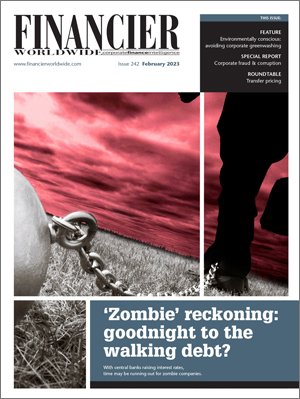BlockFi files for Chapter 11 protection
February 2023 | DEALFRONT | BANKRUPTCY & CORPORATE RESTRUCTURING
Financier Worldwide Magazine
Cryptocurrency lending platform BlockFi Inc. and eight of its affiliates have filed for Chapter 11 in the US Bankruptcy Court for the District of New Jersey. The company’s filing was done to “stabilise its business and provide the company with the opportunity to consummate a comprehensive restructuring transaction” that maximises value for all clients and other stakeholders, the company noted.
In a court filing, New Jersey-based BlockFi said it owes money to more than 100,000 creditors and had a range of liabilities and assets between $1bn and $10bn. BlockFi was backed by a number of prominent investors, including Bain Capital, Tiger Global, Coinbase and Valar Ventures, which holds a 19 percent stake, according to the filings.
Notably, crypto exchange FTX, the collapse of which triggered significant instability across the crypto space, was listed as BlockFi’s second-largest creditor, with $275m owed on a loan extended in 2022. Ankura Trust, a company that represents creditors in stressed situations, is BlockFi’s largest creditor and is owed $729m.
In June, FTX had agreed to “rescue” BlockFi with a $400m credit line with an option to purchase the company for up to $240m. The company also announced plans to cut its staffing by around 20 percent. It said that it was reducing its headcount due to “the dramatic shift in macroeconomic conditions worldwide”.
The FTX credit line allowed BlockFi to avoid a bankruptcy filing at the time, but when FTX collapsed BlockFi said it had “significant exposure” to the company and “like the rest of the world, found out about [the] situation through Twitter”. In July, BlockFi suffered losses on loans to collapsed crypto hedge fund Three Arrows Capital. Prior to the filing, BlockFi suspended withdrawals from its service saying it was “not able to operate business as usual”.
“With the collapse of FTX, the BlockFi management team and board of directors immediately took action to protect clients and the Company,” said Mark Renzi of Berkeley Research Group, the company’s financial adviser. “From inception, BlockFi has worked to positively shape the cryptocurrency industry and advance the sector. BlockFi looks forward to a transparent process that achieves the best outcome for all clients and other stakeholders.”
While activity on the platform remains paused at present, BlockFi said it had $256.9m in cash on hand. And while it expects to lay off a percentage of its workforce, it has asked the court for permission to pay employees without disruption, in hopes of retaining those workers who oversee business-critical functions.
In March 2021, BlockFi closed a $350m Series D funding round, valuing the company at $3bn at the time. Bain Capital Ventures, partners of DST Global, Pomp Investments and Tiger Global co-led the round with participation from a number of other firms. However, in 2022 the US Securities and Exchange Commission (SEC) charged BlockFi for failing to register its retail crypto lending product and violating the registration provisions of the Investment Company Act of 1940, according to a press release in February. To settle the charges, BlockFi agreed to pay a $50m penalty to the SEC and an additional $50m in fines to 32 US states to settle similar charges. BlockFi currently owes the SEC $30m according to the company’s court filing.
BlockFi was far from the only crypto company to suffer financial difficulties in 2022. Voyager Digital and Celsius Networks also both filed for Chapter 11 earlier in the year.
The aftershocks of the FTX filing will be felt for some time. The company went from a $32bn valuation to bankruptcy in a matter of days as liquidity dried up, customers demanded withdrawals and rival exchange Binance ripped up its nonbinding agreement to buy the company. FTX may have more than one million creditors, according to an updated bankruptcy filing, which is indicative of the huge impact of its collapse on crypto traders.
© Financier Worldwide
BY
Richard Summerfield

